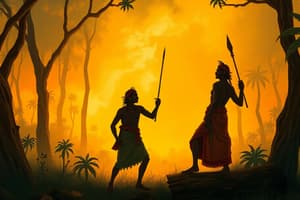Podcast
Questions and Answers
What was the main motivator behind the Peasants' Revolts in Europe during the Middle Ages?
What was the main motivator behind the Peasants' Revolts in Europe during the Middle Ages?
Social inequality and economic hardship
What was the outcome of the Spartacus revolt in Ancient Greece?
What was the outcome of the Spartacus revolt in Ancient Greece?
One of antiquity’s most famous slave wars
Who led the Arab Revolt against Ottoman rule in the Middle East during World War I?
Who led the Arab Revolt against Ottoman rule in the Middle East during World War I?
Prince Faisal bin Hussein
Which religious group rebelled against Catholicism in the Hussite Wars of 1419-1434?
Which religious group rebelled against Catholicism in the Hussite Wars of 1419-1434?
What was a common factor that motivated rebellions in different historical eras according to the text?
What was a common factor that motivated rebellions in different historical eras according to the text?
Despite many failures, what lasting impression did the Peasants' Revolts in Europe leave on society?
Despite many failures, what lasting impression did the Peasants' Revolts in Europe leave on society?
What was the significance of the Pueblo Revolt in North America?
What was the significance of the Pueblo Revolt in North America?
Describe the impact of the Zulu Uprising in Africa.
Describe the impact of the Zulu Uprising in Africa.
What led to the Taiping Rebellion in China?
What led to the Taiping Rebellion in China?
What motivated the Indonesian National Revolution after WWII?
What motivated the Indonesian National Revolution after WWII?
How do ongoing conflicts like Syria's Civil War emphasize the relevance of rebellions?
How do ongoing conflicts like Syria's Civil War emphasize the relevance of rebellions?
What are some risks associated with historical rebellions?
What are some risks associated with historical rebellions?
Flashcards are hidden until you start studying
Study Notes
Rebellions through History
Conflicts between rulers and their subjects have been a part of human history since ancient times. These challenges against authority often take form as rebellions — mass movements driven by frustration, dissent, and aspirations for change. Let's delve into some notable examples from different eras, reflecting diverse motivators and outcomes.
Ancient Greece
- Spartacus (73 BCE): A gladiator revolt, this conflict pitted enslaved warriors against Rome, resulting in one of antiquity’s most famous slave wars.
Middle East
- The Arab Revolt (1916–18): Led by Prince Faisal bin Hussein, tribal forces battled Ottoman rule during World War I, ultimately contributing to the establishment of modern nations like Jordan, Iraq, and Saudi Arabia.
Europe
- Peasant's Revolts (Middle Ages): Incentivized by social inequality and economic hardship, peasant armies in England and Germany asserted class grievances against feudal lords. Although many failed, they left lasting impressions imprinted upon European society.
- Hussite Wars (1419-1434): Bohemian farmers led by Jan Želivský rebelled against Catholicism, rejecting papal and royal privileges in favor of religious freedom. Despite initial success, the Hussites eventually fell under Habsburg dominion.
North America
- Pueblo Revolt (1680): Native American tribes across New Mexico overthrew Spanish colonialism, driving out settlers and priests; the Pueblos would hold sway until Mexican independence in 1821.
Africa
- Zulu Uprising (c. 1856-57): A Zulu army invaded British possessions in South Africa, sparking fierce warfare with profound implications for global imperialism. Ultimately, however, the British prevailed.
Asia
- Taiping Rebellion (1851-1864): China saw its greatest civil strife when Hong Xiuquan launched a reformist movement aimed at ending Manchu domination. With millions perishing, the Taipings had far-ranging repercussions for Chinese culture and politics.
- Indonesian National Revolution (1945-1949): After Japan surrendered in WWII, Indonesia sought liberation from Dutch colonial rule. This protracted struggle resulted in sovereignty, though it was achieved at great cost.
In recent years, ongoing conflicts such as Syria's Civil War continue to underscore the relevance and enduring importance of rebellions in our world. While these struggles can produce significant changes, they also carry risks—including fragmentation, displacement, and power vacuums—that complicate efforts towards resolution and reconciliation.
Studying That Suits You
Use AI to generate personalized quizzes and flashcards to suit your learning preferences.




